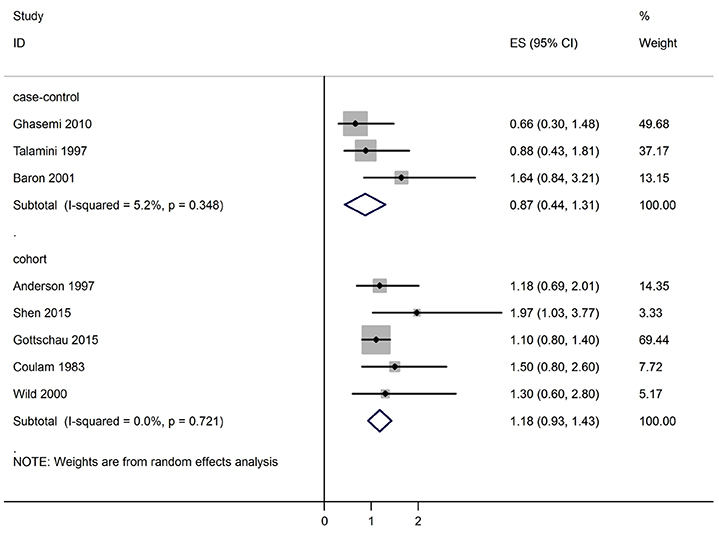Obstet Gynecol Sci.
2016 Sep;59(5):367-372. 10.5468/ogs.2016.59.5.367.
The association between polycystic ovary syndrome and breast cancer: a meta-analysis
- Affiliations
-
- 1Mother and Child Care Research Center, Hamadan University of Medical Sciences, Hamadan, Iran. en.jenabi@yahoo.com
- KMID: 2391686
- DOI: http://doi.org/10.5468/ogs.2016.59.5.367
Abstract
OBJECTIVE
The results of epidemiological studies investigated the association between polycystic ovary syndrome (PCOS) and the breast cancer are inconsistent. This meta-analysis was conducted to estimate the association between PCOS and the breast cancer risk. We searched PubMed, Web of Science, and Scopus for observational studies until June 2015. Data were independently extracted and analyzed using 95% odds ratio, and confidence intervals (CIs) based on the random-effects models.
METHODS
We identified 970 references and conducted eight studies with 45,470 participants and 243,064 person- year.
RESULTS
The association between PCOS and the breast cancer risk in case-control studies 0.87 (95% CI, 0.44 to 1.31) and that of cohort studies was estimated 1.18 (95% CI, 0.93 to 1.43).
CONCLUSION
This meta-analysis demonstrated that PCOS no does increase the risk of breast cancer. Further prospective cohort studies are needed to provide convincing evidence in order to PCOS can increase or not effect on the risk of the breast cancer.
Keyword
MeSH Terms
Figure
Reference
-
1. Balen A. Polycystic ovary syndrome and cancer. Hum Reprod Update. 2001; 7:522–525.2. Azziz R, Woods KS, Reyna R, Key TJ, Knochenhauer ES, Yildiz BO. The prevalence and features of the polycystic ovary syndrome in an unselected population. J Clin Endocrinol Metab. 2004; 89:2745–2749.3. Barry JA, Azizia MM, Hardiman PJ. Risk of endometrial, ovarian and breast cancer in women with polycystic ovary syndrome: a systematic review and meta-analysis. Hum Reprod Update. 2014; 20:748–758.4. Broekmans FJ, Knauff EA, Valkenburg O, Laven JS, Eijkemans MJ, Fauser BC. PCOS according to the Rotterdam consensus criteria: change in prevalence among WHO-II anovulation and association with metabolic factors. BJOG. 2006; 113:1210–1217.5. Wild SH, Bryden JR, Lee RJ, Bishop JL, Finlayson AR, Byrne CD, et al. Cancer, cardiovascular disease and diabetes mortality among women with a history of endometrial cancer. Br J Cancer. 2007; 96:1747–1749.6. Chittenden BG, Fullerton G, Maheshwari A, Bhattacharya S. Polycystic ovary syndrome and the risk of gynaecological cancer: a systematic review. Reprod Biomed Online. 2009; 19:398–405.7. World Health Organization. Guidelines for management of breast cancer. Cairo: World Health Organization;2006.8. Tehranian N, Shobeiri F, Pour FH, Hagizadeh E. Risk factors for breast cancer in Iranian women aged less than 40 years. Asian Pac J Cancer Prev. 2010; 11:1723–1725.9. Fauser BC, Tarlatzis BC, Rebar RW, Legro RS, Balen AH, Lobo R, et al. Consensus on women's health aspects of polycystic ovary syndrome (PCOS): the Amsterdam ESHRE/ASRM-Sponsored 3rd PCOS Consensus Workshop Group. Fertil Steril. 2012; 97:28–38.e25.10. Ghasemi N, Mortazavizadeh MR, Gerdekoohi AK. Frequency of poly cystic ovary syndrome in patients with premenopausal breast cancer. Iran J Reprod Med. 2010; 8:86–89.11. Anderson KE, Sellers TA, Chen PL, Rich SS, Hong CP, Folsom AR. Association of Stein-Leventhal syndrome with the incidence of postmenopausal breast carcinoma in a large prospective study of women in Iowa. Cancer. 1997; 79:494–499.12. Gottschau M, Kjaer SK, Jensen A, Munk C, Mellemkjaer L. Risk of cancer among women with polycystic ovary syndrome: a Danish cohort study. Gynecol Oncol. 2015; 136:99–103.13. Shen CC, Yang AC, Hung JH, Hu LY, Tsai SJ. A nationwide population-based retrospective cohort study of the risk of uterine, ovarian and breast cancer in women with polycystic ovary syndrome. Oncologist. 2015; 20:45–49.14. Schunemann H, Guyatt G, Oxman A. GRADE handbook for grading quality of evidence and strength of recommendations [Internet]. [Place unknown]: The GRADE Working Group;2013. cited 2016 Aug 5. Available from: http://gdt.guidelinedevelopment.org/app/handbook/handbook.html.15. Higgins JP, Thompson SG, Deeks JJ, Altman DG. Measuring inconsistency in meta-analyses. BMJ. 2003; 327:557–560.16. Egger M, Davey Smith G, Schneider M, Minder C. Bias in meta-analysis detected by a simple, graphical test. BMJ. 1997; 315:629–634.17. Begg CB, Mazumdar M. Operating characteristics of a rank correlation test for publication bias. Biometrics. 1994; 50:1088–1101.18. DerSimonian R, Laird N. Meta-analysis in clinical trials. Control Clin Trials. 1986; 7:177–188.19. Wild S, Pierpoint T, Jacobs H, McKeigue P. Long-term consequences of polycystic ovary syndrome: results of a 31 year follow-up study. Hum Fertil (Camb). 2000; 3:101–105.20. Coulam CB, Annegers JF, Kranz JS. Chronic anovulation syndrome and associated neoplasia. Obstet Gynecol. 1983; 61:403–407.21. Talamini R, Franceschi S, Favero A, Negri E, Parazzini F, La Vecchia C. Selected medical conditions and risk of breast cancer. Br J Cancer. 1997; 75:1699–1703.22. Baron JA, Weiderpass E, Newcomb PA, Stampfer M, Titus-Ernstoff L, Egan KM, et al. Metabolic disorders and breast cancer risk (United States). Cancer Causes Control. 2001; 12:875–880.23. Poorolajal J, Jenabi E, Masoumi SZ. Body mass index effects on risk of ovarian cancer: a meta-analysis. Asian Pac J Cancer Prev. 2014; 15:7665–7671.24. Jenabi E, Poorolajal J. The effect of body mass index on endometrial cancer: a meta-analysis. Public Health. 2015; 129:872–880.25. Gadducci A, Gargini A, Palla E, Fanucchi A, Genazzani AR. Polycystic ovary syndrome and gynecological cancers: is there a link? Gynecol Endocrinol. 2005; 20:200–208.
- Full Text Links
- Actions
-
Cited
- CITED
-
- Close
- Share
- Similar articles
-
- Medical diagnosis and treatment of polycystic ovary syndrome
- Association between polycystic ovary syndrome and risk of attention-deficit/hyperactivity disorder in offspring: a meta-analysis
- Idiopathic Intracranial Hypertension in Patient with Polycystic Ovary Syndromes
- A Case of Endometrial Cancer with Polycystic Ovary Syndrome
- Studies on Fibrinolytic System Behavior in Women with Polycystic Ovary Syndrome




